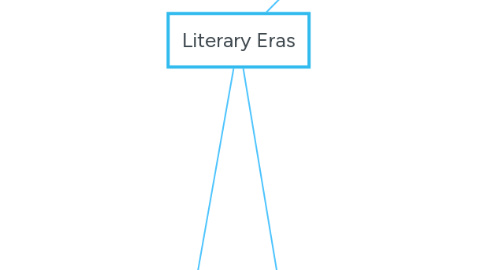
1. American Romanticism (1800-1865)
1.1. A rebellion against the Age of Reason
1.2. Characteristics of Romanticism
1.2.1. -Emotional Appeal
1.2.2. -Subjective viewpoint
1.2.3. -Glorification of the Common man
1.2.4. -Dissatisfaction with the known
1.2.5. -Experimentation with expression (music/art)
1.2.6. -Emphasis on feelings & emotions
1.2.7. -Importance of individual thought
1.2.8. -Extols nature in its wild & primitive state
1.2.9. -Rejects tradition of classicism
1.2.10. -Acceptance of the Gothic & supernatural
1.3. Nathaniel Hawthorne
1.3.1. The Scarlet Letter
1.3.2. "The Minister's Black Veil"
1.3.3. "Rappaccini's Daughter"
1.4. Washington Irving
1.4.1. "The Legend of Sleepy Hollow"
1.4.2. "Rip Van Winkle"
1.5. Fireside Poets
1.5.1. Read by families at the fireside
1.5.2. Family entertainment
1.5.3. Appealed to common man & the learned
1.5.4. Subjects
1.5.4.1. Love
1.5.4.2. Nature
1.5.4.3. Patriotism
1.5.4.4. Family
1.5.4.5. God
1.5.4.6. Religion
1.5.5. Longfellow
1.5.6. Holmes
1.5.7. Whittier
1.5.8. Lowell
1.6. Gothicism
1.6.1. -Mystery
1.6.2. -Romance
1.6.3. -Murder
1.6.4. -Supernatural
1.6.5. -Wild, desolate landscapes
1.6.6. -Ancient buildings
1.6.7. Edgar Allen Poe
1.6.7.1. "Masque of the Red Death"
1.6.7.2. "Fall of the House of Usher"
1.6.7.3. "The Tell-Tale Heart"
1.6.7.4. "Pit and the Pendulum"
1.7. Transcendentalism
1.7.1. "Transcends" literal interpretation, which relies upon the 5 senses
1.7.2. Moves from the rational to the spiritual
1.7.3. Every soul is one with God & a part of the "Divine Soul" or "Oversoul"
1.7.4. God is found in nature & in human nature
1.7.5. Evil is negative
1.7.6. There is a unity of all things
1.7.7. Intuition vs. reason
1.7.8. The center of the universe is SELF
1.7.9. Self-realization is most important
1.7.10. Ralph Waldo Emerson
1.7.10.1. "Nature"
1.7.10.2. "Self-Reliance"
1.7.10.3. Aphorisms
1.7.11. Henry David Thoreau
1.7.11.1. "Walden"
1.7.11.2. "Resistance to Civil Government"
1.7.11.3. Born in Concord, MA
1.7.11.4. Never married
1.7.11.5. Best friend-Emerson
1.7.11.6. Harvard education
1.7.11.7. School teacher, but fired for refusing to whip a student
1.7.11.8. Passive Resistance (jail) - Influenced Gandhi, MLK Jr.
1.7.11.9. Lived in woods near Walden Pond, for 2 years
1.7.11.10. Thoreau's "Civil Disobedience"
1.7.11.10.1. Spent night in hail as he refused to pay taxes in protest of Mexican American War, which would perpetuate slavery
1.7.11.10.2. Opposed slavery & harbored many fugitive slaves in parents' home
1.7.11.11. Writing Style
1.7.11.11.1. Reflects nature & transcendentalism
1.7.11.11.2. Detailed
1.7.11.11.3. Thought-provoking
1.7.11.11.4. Uses paradoxes
2. Deism
2.1. Come from different religious backgrounds
2.1.1. Franklin
2.1.2. Jefferson
2.1.3. Thomas Paine
2.2. Looked to identify principles that united all religions
2.3. Beliefs-
2.3.1. The universe is orderly & good
2.3.2. Stressed humanities inherent goodness
2.3.3. Perfectibility of every individual through the use of reason
2.3.4. God's objective=happiness of people
2.3.5. Provided the basic for the principles of the American Revolution & system of government
3. The Age of Reason (Late 1700s)
3.1. God & the Natural World
3.1.1. Rationalists thought that it was unlikely for God to choose to reveal himself at particular times to particular people
3.1.2. Believed that God made it possible for all people at all times to discover natural laws through their God-given faculty of reason
3.2. Puritans vs. the Revolutionary Period
3.2.1. Scientists, philosophers, political theorists, writers and thinkers of the Enlightenment valued reason over faith
3.2.2. Believed in the power of reason & science to further human progress
3.2.3. Believed people are by nature good
3.2.4. Public writing was produced during this period
3.3. The Age of Reason as a Literary Period
3.3.1. Age of Reason: movement that was marked by an emphasis on rationality, scientific inquiry, and representative government in place of monarchy
3.3.2. Important Writers
3.3.2.1. Thomas Jefferson
3.3.2.2. Benjamin Franklin
3.3.2.2.1. Aphorism: A penny saved is a penny earned
3.3.2.2.2. Wrote the first section of The Autobiography in 1771 at the age of 65
3.3.2.2.3. At the urging of friends, he wrote 3 more sections-the last shortly before his death
3.3.2.2.4. Autobiography provides a record of his achievements & understanding of his character (never completed)
3.3.2.2.5. Considered to be the "father of his country"
3.3.2.3. Thomas Paine
3.3.2.3.1. -Renowned pro-American writer & author of persuasive texts of the American Revolution
3.3.2.3.2. -Used "plain-style" language in an attempt to engage people of all classes in the struggle for American independence & for a rejection of government based on hereditary monarchy
3.3.2.3.3. -His bold & simple argument rallied a scattered citizenry to the cause of freedom & exerted considerable influence on the new nation's emerging political philosophy
3.3.2.3.4. -Wrote the first "American Crisis" letter pamphlets after witnessing the loss of New York & joining the retreat to Newark (a text George Washington ordered read to all troops)
3.3.2.3.5. Pamphlets helped bolster the sagging spirits of the ill-fitted troops & firm the resolve of an occasionally diffident population
3.3.2.4. Patrick Henry
3.3.2.5. Other "Founding Fathers"
3.4. Important Pieces of Literature
3.4.1. Political documents
3.4.1.1. Ex: Declaration of Independence
3.4.2. Speeches
3.4.3. Pamphlets
3.4.3.1. Ex: Thomas Paine's "The Crisis"
3.4.4. Non-fiction was more influential than fiction
3.4.4.1. Ex: Autobiography of Benjamin Franklin

